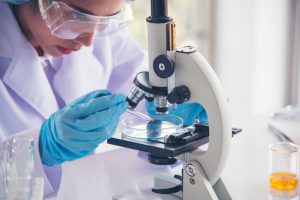Polycystic ovary syndrome (PCOS) is a common endocrine disorder that affects millions of women worldwide, impacting their hormone balance, fertility, and overall well-being. Treatment is notoriously difficult because the symptoms are highly variable and the causes are mysterious and complex.
Researchers at the University of Chicago have presented a potential new PCOS treatment that could improve several PCOS symptoms by regulating bodily systems and reducing inflammation. Recently published findings support the potential of this novel therapeutic approach, which uses extracellular vesicles (EVs) derived from mesenchymal stem cells, also known as exosomes: tiny, free-floating packages of molecules released by stem cells.
How Mesenchymal Sem Cells Help With PCOS
“Current PCOS treatments only address the symptoms, and the most common treatments—oral contraceptives—do not address the patients’ infertility issues,” said Hang-Soo Park, PhD, a research associate at the University of Chicago and first author of the study. The researchers’ approach represents a paradigm shift from treating symptoms to treating the underlying causes. They hope that in the long term this will prove more effective and enable patients to have children. The group had previously published findings that mesenchymal stem cells (MSCs) – adult cells that can differentiate into multiple cell types for healing and regeneration – can secrete factors that help reverse the symptoms of PCOS. However, it was unclear which factors these were.
The latest study identifies the EVs they release as therapeutic components. The researchers found that MSC-derived EVs reduce the activity of genes that contribute to the overproduction of androgen hormones – a hallmark of PCOS. Based on this finding, the scientists injected the EVs into PCOS mouse models, where they helped to stabilize some of the metabolic abnormalities commonly associated with the disease, such as high glucose levels. The EVs can be injected either into blood vessels or directly into the ovaries of the mice, and in both cases they actually restored ovarian function. The study demonstrates the resilience of ovaries under EV treatment and, according to Park, offers new hope to women struggling with fertility issues related to PCOS.
Researchers believe that an immune signaling protein known as IL-10, known for its anti-inflammatory properties, may play a key role in the observed healing. The EVs could serve as a means of transport that stabilizes and delivers IL-10 to the target cells, increasing the molecule’s effectiveness in reducing inflammation and promoting regenerative processes. EV-based therapy has distinct advantages over conventional methods. Unlike traditional stem cell therapy, EVs are more accessible and cost-effective to use, making them well-suited for large-scale applications. They also offer a superior safety profile with minimal concerns regarding tumorigenesis or immunogenicity. Remarkably, clinical trials of EV therapy for reproductive disorders have already yielded positive results, demonstrating the strong potential for translating this research into real-world benefits.





